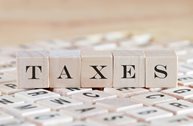Beginners Guide to Income Tax
Income tax is a reality of life for anyone earning money in Australia – and for most people the process of putting in a tax return has become a relatively straightforward annual habit. But what if you're new to the tax system?
Maybe you're starting your first after school job, or you've just finished school or uni and heading into your first job, or you're a newly arrived migrant. Whatever the reason, it's understandable that you might not fully grasp the income tax system in Australia just yet. But don't worry, we're here to help – and we've put together an easy-to-follow beginners guide, just for you:
What is income tax?
Income tax is paid on all forms of income, including wages from your job, profits from your business and returns from investments such as bank interest and dividends. It can also be payable if you sell or give away a valuable asset such as a house or shares.
Each individual is allowed to have income of up to $18,200 each year without paying income tax, and this is called the tax-free threshold. However, if your income is more than $18,200 then you will probably have to pay tax.
Australia has what is called is a 'progressive tax system'. That means the higher your income, the higher the rate of tax you need to pay. Our lowest tax rate is 16% for the 2024-25 year. As part of the 2025-26 budget, the Government announced this lowest tax rate will decrease to 15% from 1 Jul 2026 and to 14% from 1 July 2027. For the 2013 through to the 2024 years, the lowest tax rate was 19%. The lowest tax rate kicks in on the first dollar you earn over the tax-free threshold. Our highest tax rate is 45% but this is only charged on income over $190,000 for the 2024-25 year. Prior to the 2025 year, the highest tax rate of 45% was charged on income over $180,000 Most people pay somewhere in between these two rates. These rates do not include the medicare levy (2% for most people) or medicare levy surcharge (payably by high income earners who do not have private hospital cover).
Current resident tax rate brackets in Australia 2024-25
|
Taxable income |
Tax on this income |
|
0 – $18,200 |
Nil |
|
$18,200 - $45,000 |
16c for each $1 over $18,200 |
|
$45,001 - $135,000 |
$4,288 plus 30 cents for each $1 over $45,000 |
|
$135,001 - $190,000 |
$31,288 plus 37 cents for each $1 over $135,000 |
|
$190,001 and over |
$51,638 plus 45 cents for each $1 over $190,000 |
Resident tax rate brackets in Australia 2023-24
|
Taxable income |
Tax on this income |
|
0 – $18,200 |
Nil |
|
$18,200 - $45,000 |
19c for each $1 over $18,200 |
|
$45,001 - $120,000 |
$5,092 plus 32.5 cents for each $1 over $45,000 |
|
$120,001 - $180,000 |
$29,467 plus 37 cents for each $1 over $120,000 |
|
$180,001 and over |
$51,667 plus 45 cents for each $1 over $180,000 |
Note: The above rates do not include the Medicare levy of 2%.
Types of taxable income:
Income can be earned in a variety of ways, including:
-
Employment income (such as salary and wages, allowances, bonuses, tips, fringe benefits, lump sum payments and super contributions)
-
Centrelink and other government payments (such as the age pension, Austudy, Abstudy, Jobseeker, youth allowance,carer payments and parenting payment)
-
Investment income (including bank interest)
-
Business income
How do I pay income tax?
If you work for an employer, income tax will be automatically deducted from your wage or salary and paid directly to the Australian Taxation Office (ATO), which means the amount you receive in your bank account every payday is the amount after tax.
With other forms of income, such as business profits or bank interest, you have to account for income tax yourself.
Every year, most taxpayers need to complete an income tax return, which is a document that records all your income for the year and allows you to work out your tax liability. Sometimes, your employer will already have paid enough tax on your behalf during the year, so you won't owe any tax to the taxman. Often, in fact, you'll have paid a little bit too much tax and you'll be eligible for a refund. If you earn other income outside your job, or if none of your income is from a paid job, it's most likely you'll have to pay tax based on the liability you calculate in your tax return.
Who has to lodge a tax return?
Taxpayers who must submit a tax return include:
-
Most resident individuals whose total income exceeds the $18,200 tax-free threshold for the income year
-
Every individual carrying on a business or profession regardless of income or loss
-
Any resident taxpayer earning less than $18,200 who has had tax withheld from that income through their job
Click here to read more about lodging for the first time.
When do I need to do my tax return?
You need to lodge your tax return as soon as possible after 30 June and no later than 31 October (the deadline) each year.
If you lodge your tax return through a tax agent, such as H&R Block, then you will normally be granted an extension of this deadline beyond 31 October, but only if you are listed with the ATO as a client of the tax agent by that date.
and what about deductions?
As well as recording your income, you can also use your tax return to claim deductions for certain expenses incurred by your work activities during the year. These deductions reduce your taxable income and are often the reason many people get a tax refund when they lodge their tax return.
The most common deductions are those related to money spent as part of your work. If you have spent money on something in order to do your job (such as purchasing uniforms, paying for travelling or ongoing education expenses) you may be entitled to claim that cost as a tax deduction.
Examples of some of the deductions you may be able to claim include:
- Vehicle and travel expenses
- Clothing, laundry and dry-cleaning expenses
- Home office expenses
- Protective equipment (including hard-hats, gloves, safety glasses, sun glasses and face masks
- Rapid Rapid Antigen Tests purchased as a requirement for work and hand sanitiser required for work
- Self-education expenses
- Tools, equipment and other assets
- Cost of managing tax affairs
- Gifts and donations
- Interest, dividend and other investment income deductions
- Personal super contributions
- Undeducted purchase price of a foreign pension or annuity
- Interest charged by the ATO (prior to 1 July 2025)
But it's a good idea to double check anything you are looking to claim with your tax agent first to ensure it's eligible, and it's important to have receipts and documentation to support each and every claim. Remember to only claim what you are entitled to. You cannot claim private expenses or things that have been reimbursed by your employer. If you are unsure, you can always ask one of H&R Block's tax professionals by popping into your nearest office.
Is income tax complicated?
It can be, and that's why so many people choose to use a tax agent like H&R Block to prepare their tax return. Getting professional help takes the stress out of the process and ensures your return is correct and lodged on time. Best of all, tax agents will often be able to highlight deductions you didn't know you could claim!
Call 13 23 25 today or book an appointment at your nearest office.
How do I learn more about income tax?
Millions of tax returns are lodged across Australia each year, and H&R Block leads the way by preparing more of them than any other company, with 400 offices throughout the country.
The H&R Block Income Tax Course is the first step to becoming a Tax professional. This course will equip you with the knowledge and skills required to professionally prepare tax returns and foster connections that extend far beyond preparing the return. But don't just take our word for it! Hear from our past graduates about how the Income Tax Course shaped their futures. Many found it a springboard to rewarding careers with H&R Block, gaining practical skills along the way.
Register for Australia’s leading Income Tax Course today to unlock Graduate Career Opportunities in 2026.
Updated June 2025


.png?width=55&height=48&ext=.png)
-1.svg)

